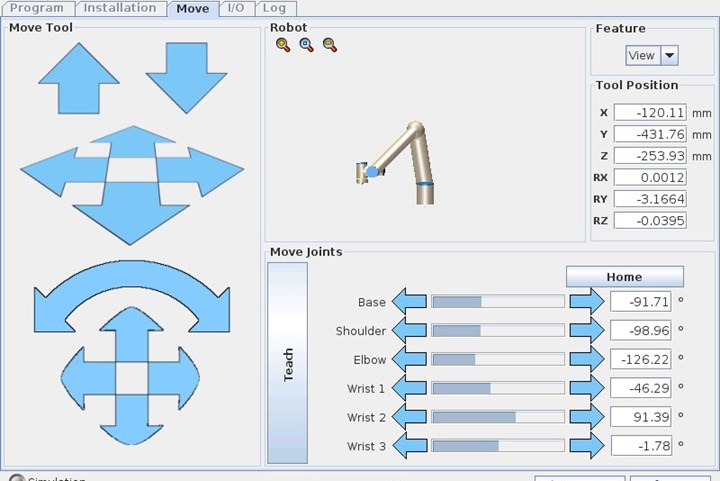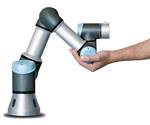Collaborative robot manufacturer Universal Robots has developed an educational offering that provides an industry-recognized certificate as part of its Universal Robots Program for Education. Introduced at the virtual Cobot Expo 2.0, the education program allows schools to purchase a training package that includes the complete curriculum, a UR cobot arm, and the hardware and software required to build actual industrial applications with hands-on learning.
The 32-hour course has been developed with assistance from Ritch Ramey, coordinator of RAMTEC, (The Robotics and Advanced Manufacturing Technology Education Collaborative) who oversees robotics training at the 24 Tri-Rivers career centers in Ohio. Upon completion of the International Accreditors for Continuing Education and Training (IACET) accredited course work, a student receives 32 course credit hours and a Universal Robots industry-recognized certification.
In addition to the formalized core curriculum, the Universal Robots Program for Education Package consists of:
- UR Cobot Unit (UR3e or UR5e)
- 24 course licenses
- Gripper Demo Kit
- One conveyor assembly including conveyor, encoder, two sensors and I/O simulation test box
- 10 3D-printed training elements for exercises
- One 3D-printed dual TCP
- Six 3D-printed workpieces
Accelerate Tomorrow’s Engineers Today
In a virtual press conference, Joe Campbell, senior manager of applications development at UR, said this new in-person offering builds off the company’s online Universal Robots Academy. Free and available globally in 16 languages, Campbell said the academy has trained more than 100,000 individuals on the use of UR robots.
The Program for Education intends to extend that reach into younger generations, by putting cobots in classrooms. “We want to try to make manufacturing interesting for younger generations who so far haven’t been particularly interested,” Campbell said, “and to accelerate tomorrow’s engineers today—make them aware of the the technology.”
The educational offering will target high schools and vocational schools, but also community colleges and even down to middle schools, putting students on a path to an Advanced Manufacturing/Robotics Industry 4.0 career, according to Campbell. The focus will be on robot fundamentals, and expanded factory interconnectivity training, and will include employment skills, project management and problem solving, with hands-on exercises and student-based projects.
The curriculum includes an introduction to robotics, with an emphasis on safety. It also teaches operations and motion control, programming, palletizing, and features/planes. Campbell noted that the content is interactive, and includes graphical representation of the teach pendant. There is also a teacher certification track to train teachers in instructing the course work.

The ready-to-go package that includes the complete curriculum, a UR cobot arm, and the hardware and software required to build actual industrial applications.
Related Content
-
Blow Molder with a Mission: CKS Packaging Shares Gains Of Its Phenomenal Growth
From three machines in 1986 to 27 plants nationwide today, this family-owned processor has prospered through unwavering customer service, committed employees and dedicated service to its community.
-
Mold-Change Time Targeted with Training, Technology
Engel is offering technology and training to molders to help them optimize their mold-changing process.
-
The Cost of High Employee Turnover in Injection Molding: Why Retention Matters
Starting in molding in 1993 and clocking in for nearly every job on the floor over the intervening decades, I’ve seen all sides of the hiring, training and retention process in the industry. Here are my thoughts on how to keep your most important asset — your people.
















